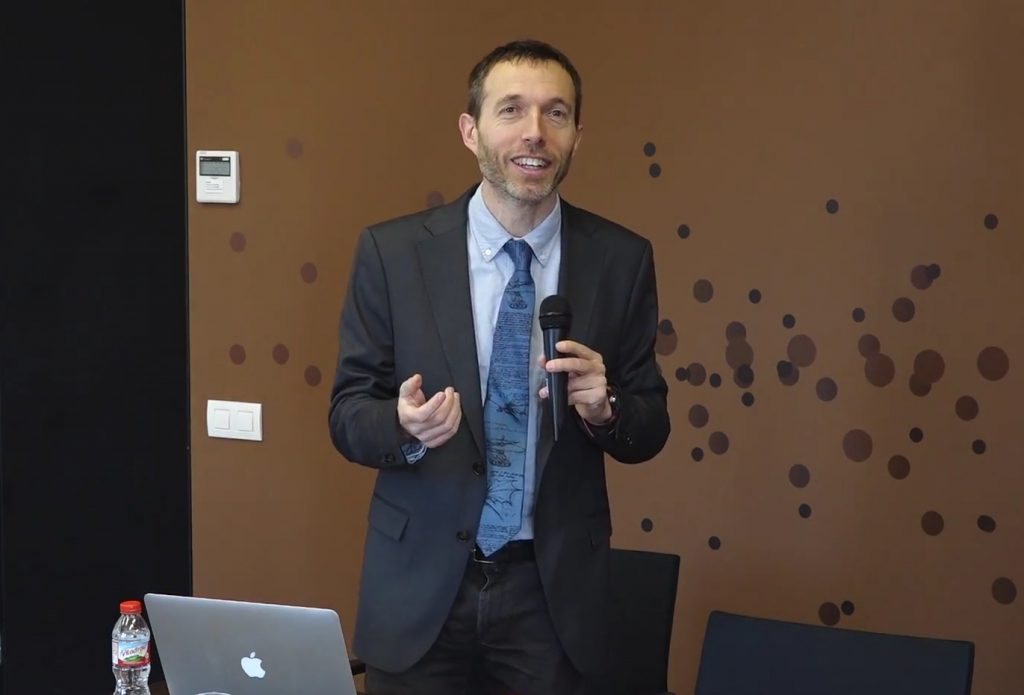Dr. Jennifer Neville (Purdue University)

Title
Towards Relational AI -- the good, the bad, and the ugly of learning over networks
Abstract
In the last 20 years, there has been a great deal of research on machine learning methods for graphs, networks, and other types of relational data. By moving beyond the independence assumptions of more traditional ML methods, relational models are now able to successfully exploit the additional information that is often observed in relationships among entities. Specifically, network models are able to use relational information to improve predictions about user interests, behavior, and interactions, particularly when individual data is sparse. The tradeoff however, is that the heterogeneity, partial-observability, and interdependence of large-scale network data can make it difficult to develop efficient and unbiased methods, due to several algorithmic and statistical challenges. In this talk, I will discuss these issues while surveying several general approaches used for relational learning in large-scale social and information networks. In addition, to reflect on the movement toward pervasive use of the models in personalized online systems, I will discuss potential implications for privacy, polarization of communities, and spread of misinformation.
Bio
Jennifer Neville is the Miller Family Chair Associate Professor of Computer Science and Statistics at Purdue University. She received her PhD from the University of Massachusetts Amherst in 2006. She is currently PC chair of the 19th SIAM International Conference on Data Mining. She was an elected member of the AAAI Executive Council from 2015-2018. In 2016 she was PC chair of the 9th ACM International Conference on Web Search and Data. In 2012, she was awarded an NSF Career Award, in 2008 she was chosen by IEEE as one of "AI's 10 to watch", and in 2007 was selected as a member of the DARPA Computer Science Study Group. Her work, which includes 100+ peer-reviewed publications with more than 7500 citations, focuses on developing machine learning and AI methods for complex relational domains, including social, information, and physical networks.
--------------------------------------------------------------------------------------
Prof. Hui Xiong

Title
Talent Analytics: Prospects and Opportunities
Abstract
The big data trend has made its way to talent management. Indeed, the availability of large-scale human resources (HR) data provide unparalleled opportunities for business leaders to understand talent behaviors and generate useful talent knowledge, which in turn deliver intelligence for real-time decision making and effective people management at work. In this talk, we introduce the powerful set of innovative big data techniques developed for intelligent human resource management, such as recruiting, performance evaluation, talent retention, talent development, job matching, team management, leadership development, and organization culture analysis. In addition, we will also demonstrate how the results of talent analytics can be used for other business applications, such as market trend analysis and financial investment.
Bio
Hui Xiong is a Professor at Rutgers University, and is currently on leave and serving as head of Business Intelligence Lab and Talent Intelligence Center at Baidu Inc. His research interests include data mining, mobile computing, and their applications in business. He has authored over 200 research articles, and co-edited or coauthored 4 books including the widely used Encyclopedia of GIS, which has been recognized as the Top 10 Most Popular Computer Science Book authored by Chinese scholars at Springer. Dr. Xiong has served as chair/co-chair for many international conferences in data mining, including a Program Co-Chair (2013) and a General Co-Chair (2015) for the IEEE International Conference on Data Mining (ICDM), and a Program Co-Chair of the Research Track (2018) and the Industry Track (2012) for the ACM SIGKDD International Conference on Knowledge Discovery and Data Mining (KDD). Dr. Xiong’s research has generated substantive impact beyond academia. He is an ACM distinguished scientist and has been honored by the 2018 Ram Charan Management Practice Award as the Grand Prix winner from the Harvard Business Review, the 2017 IEEE ICDM Outstanding Service Award, and the ICDM-2011 Best Research Paper Award.
--------------------------------------------------------------------------------------
Prof. Josep Domingo-Ferrer

Title
Empowering Subjects, Users and Controllers when Anonymizing Big Data for Knowledge Discovery and Data Mining
Abstract
Big data are analyzed to reveal patterns, trends and associations, especially relating to human behavior and interactions. However, according to the European General Data Protection Regulation (GDPR), which is becoming a de facto global data protection standard, any intended uses on personally identifiable information (PII) must be clearly specified and explicitly accepted by the data subjects. Furthermore, PII cannot be accumulated for secondary use. Thus, can exploratory data uses on PII be GDPR-compliant? Hardly so.
Resorting to anonymized data sets instead of PII is a natural way around, because anonymized data fall outside the scope of GDPR. The problem is that anonymization techniques, based on statistical disclosure control and privacy models, use algorithms and assumptions from the time of small data that must be thoroughly revised, updated or even replaced to deal with big data. The following questions arise:
– How can the subject keep control of her data and the way they are anonymized in the current landscape featuring a crowd of data collectors, controllers and processors, most of them not trusted?
– Can anonymized data sets be merged to obtain big data sets? Can these be usefully explored?
– Do the current privacy models share underlying principles that can be exploited to upgrade them for big data?
– Are there universal or near-universal masking approaches that can satisfy any privacy model?
– How to compare privacy and utility under different privacy models and masking methods?
This keynote talk will give an overview of the current state of the previous questions. It will also identify open research lines aimed at producing anonymized big data sets that can be exploited by users for exploratory analyses, while giving subjects control on their data and making the job of controllers easier.
Bio
Josep Domingo-Ferrer is a Distinguished Professor of Computer Science and an ICREA-Acadèmia Researcher at Universitat Rovira i Virgili, Tarragona, Catalonia, where he holds the UNESCO Chair in Data Privacy. He has founded and leads CYBERCAT-Center for Cybersecurity Research of Catalonia, headquartered in Tarragona and Barcelona.
His research interests are in data privacy, anonymization, statistical disclosure control, security and cryptographic protocols, with a focus on the conciliation of privacy, security and functionality. In these fields he has authored over 418 publications and 5 patents, and he has coordinated major research projects (including the European H2020 "CLARUS" project).
He is an IEEE Fellow, an ACM Distinguished Scientist, an Elected Member of Academia Europaea and an Elected Member of the International Statistical Institute. He has won several other distinctions, including a Google Faculty Research Award and several research prizes.
More information at https://crises-deim.urv.cat/jdomingo
* Paper Submission Due
October 10, 2018
October 17, 2018
* Notification to Authors
December 15, 2018
* Camera-ready Due
January 15, 2019
* Conference Date
April 14-17, 2019
All deadlines are 11:59pm Pacific Standard Time (PST)